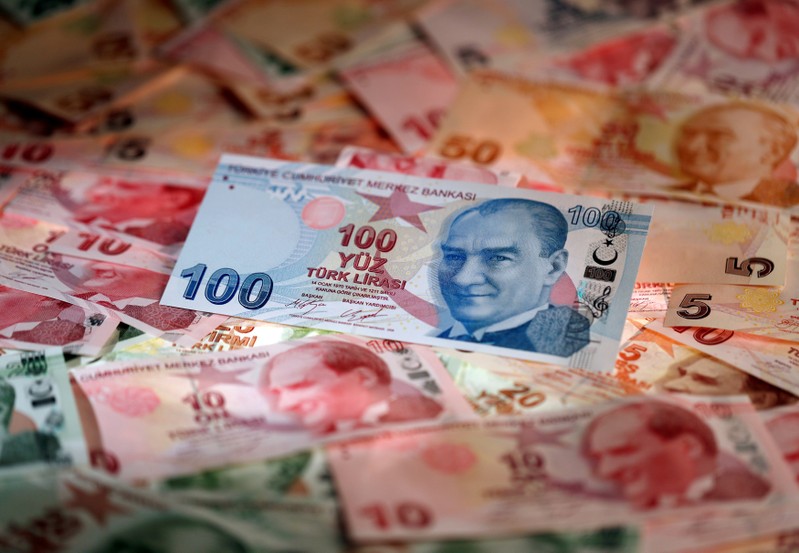
FILE PHOTO: FILE PHOTO: Turkish Lira banknotes are seen in this October 10, 2017 picture illustration. REUTERS/Murad Sezer/File Photo/File Photo
August 15, 2018
By Sinéad Carew
NEW YORK (Reuters) – Equities around the world took a dive on Wednesday, with emerging market stocks set to confirm a bear market and the dollar hitting a 13-month high, while weakness in China’s yuan rattled investors’ nerves.
The stronger dollar also put commodities under pressure across the board, with copper hitting a 12-month low and gold at an 18-month low. Oil futures also lost ground.
While fears of a crisis in Turkey still loomed, China was in sharp focus as the yuan <CNH=EBS> sagged nearly 0.8 percent to 6.9467 per dollar, hitting its weakest level since January 2017 following disappointing economic data earlier this week. [L5N1V645W]
The data stoked speculation whether the People’s Bank of China would intervene with more fiscal stimulus to stem its currency from breaking through the 7-yuan mark.
“Today investors are waking up to the idea that the situation in China may be pretty impactful as far as global markets go,” said Emily Roland, head of capital markets research at John Hancock Investments.
“With China being the engine of global economic growth, if you start to see their currency weaken significantly because of the slowdown we’re seeing there and you start to see the dollar meaningfully increase, there could become a point where there’s a liquidity issue globally,” Roland added.
Turkey’s lira eked out a second day of gains as authorities tightened the screws on foreign investors aiming to short the currency. But the country’s failure to tackle galloping inflation kept investors fearful that Turkey was headed for full-blown crisis and debt defaults.
Investors stepped up safe-haven holdings of the U.S. dollar due to worries about China and Europe’s exposure to Turkey, which pushed the euro to its weakest level in over a year.
The dollar index <.DXY> was flat, with the euro <EUR=> down 0.01 percent to $1.1341.
The S&P 1500 Metals & Mining index <.SPCOMMTM> was down 4.6 percent, on track for its biggest one-day drop since March, after hitting its lowest point since late November earlier in the day.
Spot gold <XAU=> dropped 1.3 percent to $1,177.84 an ounce.
Industrial metal prices also tumbled, with benchmark copper <CMCU3> hitting a 15-month low of $5,773 a ton on the London Metal Exchange and zinc <CMZN3> touching $2,291, a level last seen in October 2016. Lead <CMPB3> dropped as low as $1,919.50, its lowest since September 2016 and the metal’s biggest daily loss in nearly seven years.
MSCI’s emerging equities index <.MSCIEF> was last down 1.9 percent after having fallen more than 20 percent from its January intraday high earlier in the day. Latin American currencies also slid.
The Dow Jones Industrial Average <.DJI> fell 279.22 points, or 1.1 percent, to 25,020.7, the S&P 500 <.SPX> lost 31.98 points, or 1.13 percent, to 2,807.98 and the Nasdaq Composite <.IXIC> dropped 124.91 points, or 1.59 percent, to 7,745.99.
The pan-European FTSEurofirst 300 index <.FTEU3> lost 1.41 percent and MSCI’s gauge of stocks across the globe <.MIWD00000PUS> shed 1.27 percent.
The CBOE Volatility Index <.VIX>, Wall Street’s so-called “fear gauge,” jumped to a more than six-week high of 16.86, showing rising demand for protection against a near-term drop in U.S. stocks. The index was last up 2.97 points at 16.28.
Benchmark 10-year U.S. Treasury notes <US10YT=RR> last rose 12/32 in price to yield 2.8533 percent, from 2.895 percent late on Tuesday.
(Graphic: Dollar, U.S. Treasuries benefit from safe haven flows: https://reut.rs/2P84bbH)
(Graphic: Turkey’s ripple effect on global assets, so far: https://reut.rs/2KTqwGI)
The backdrop to all this is the escalation in global trade tensions, with Beijing lodging a complaint to the World Trade Organization to determine the legality of U.S. tariff and subsidy policies.
Turkey has also raised tariffs on some U.S. products “in response to the U.S. administration’s deliberate attacks on our economy”, Vice President Fuat Oktay wrote on Twitter.
U.S. crude oil <CLcv1> fell 2.95 percent to $65.06 per barrel and Brent <LCOcv1> was last at $70.83, down 1.95 percent on the day after data showed U.S. crude stockpiles jumped last week, compounding worries about a weaker global economic growth outlook.
(Additional reporting by Richard Leong, Saqib Iqbal Ahmed abd Rodrigo Campos in New York, Shinichi Saoshiro in Tokyo and Marc Jones in London; Editing by Louise Ireland and Dan Grebler)
